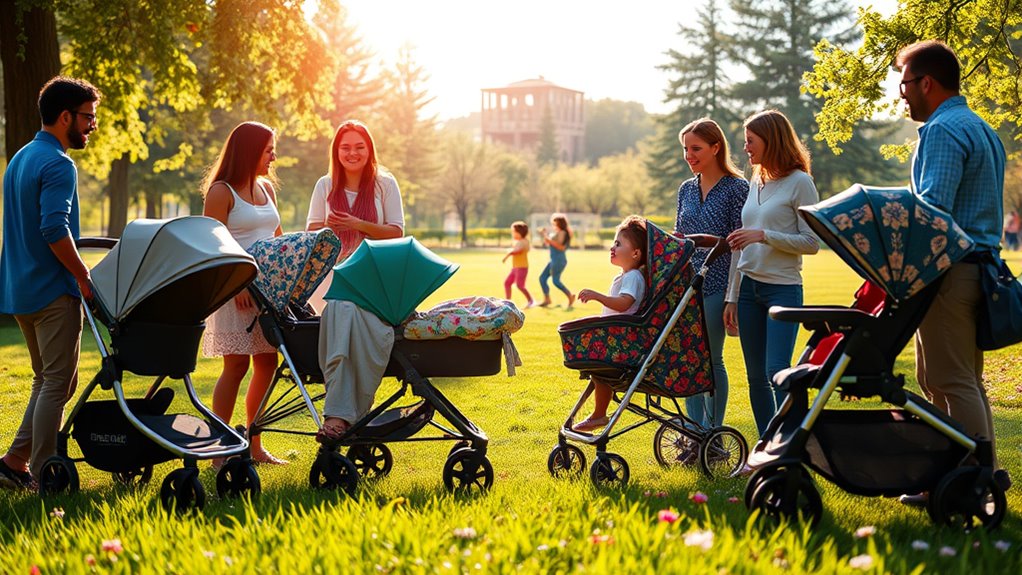When picking a stroller, consider your lifestyle and needs first. Think about the type you’ll use, like an umbrella for travel or a jogging option for exercise. Check key features like stroller suspension for comfort and ease of folding for convenience. Safety is crucial, so find one with good harnesses and brakes. Don’t forget about storage space for essentials. Each factor plays a role in your decision, and there’s more to explore that might surprise you.
Key Takeaways
- Consider the type of stroller that best fits your lifestyle, whether it’s traditional, umbrella, jogging, or double strollers.
- Evaluate key features like suspension, wheel size, and storage capacity for comfort and functionality.
- Prioritize safety aspects, including harness design, stability, and effective braking systems.
- Assess the stroller’s suitability for your environment, focusing on maneuverability in urban or rugged terrains.
- Factor in your budget, balancing durability and features against overall investment and warranty support.

When it comes to choosing the right stroller, you might feel overwhelmed by the options available. With various types like traditional, umbrella, jogging, car-seat carrier, and double strollers, you must consider what fits your lifestyle best. If you’re planning long walks or daily errands, a traditional stroller with reclining seats and car-seat compatibility could be your best bet.
Choosing the right stroller can be overwhelming; consider your lifestyle and needs to find the perfect fit.
On the other hand, if you travel frequently, an umbrella stroller‘s lightweight and compact design will make your life much easier.
As you explore these options, think about key features that matter. The stroller’s suspension and wheels play a crucial role in ride comfort and maneuverability. If you plan to tackle uneven terrain, look for strollers with larger wheels and good suspension.
Foldability is another important aspect; a one-handed fold is a game-changer for busy parents. You’ll also appreciate ample storage capacity for all those essentials you need on the go.
Safety should never take a backseat when selecting a stroller. Stability is essential to reduce the risk of tipping over, especially if you’re navigating slopes. Check out the braking system, too; effective brakes give you control when you need it most.
You’ll also want to ensure that the harness and seat design securely protect your child. Opt for durable materials that extend the lifespan of your stroller, and look for certifications from trusted organizations like Consumer Reports.
Consider where you’ll be using the stroller most often. City dwellers might prefer strollers with smaller wheels designed for smooth pavements and tight spaces. If you live in the countryside, focus on strollers that can handle rugged terrain.
Versatile strollers can adapt to mixed terrains, making them ideal for various environments.
User experience is vital, so look for intuitive folding mechanisms and easy maneuverability. Features like cushioning and recline options enhance your child’s comfort. Adjustable handlebars make it easier for different users to push the stroller without discomfort.
Lastly, think about your budget and what value you’re getting. Strollers range widely in price, so assess features against costs. Durability often justifies a higher price, and some strollers offer additional accessories that can enhance their functionality.
A good warranty and customer support can also make your investment more worthwhile. With all these factors in mind, you’ll be well on your way to picking the stroller that suits you and your family best.
Frequently Asked Questions
What Age Range Is Suitable for Using a Stroller?
The suitable age range for using a stroller generally starts from newborns up to around three years old.
For newborns to six months, you’ll want a stroller that fully reclines or has a bassinet attachment.
As your child grows from six months to one year, you can switch to an umbrella stroller.
By age three, many kids begin to walk more independently, reducing their need for a stroller.
Adjust your choice based on your child’s development.
How Much Weight Can Most Strollers Support?
Most strollers can support children up to about 49 pounds, which is roughly the weight of a six-year-old.
If you’re looking for longer use, some models, like the Mockingbird Single Stroller, can handle up to 50 pounds.
Keep in mind that weight capacity varies by design and materials, so it’s crucial to check specifications.
Strollers built with reinforced frames and quality suspension systems often offer better stability for heavier children.
Are Strollers Safe for Newborns?
Are strollers safe for newborns? Absolutely, but you need to choose wisely.
Look for strollers with a reclining capability, five-point harness, and sturdy frame. Ensure they’re compatible with bassinets or infant car seats.
Always buckle your newborn securely, never leave them unattended, and engage the brakes when stationary.
Checking weight limits and safety standards is essential, so you can confidently take your little one out and about while keeping them safe.
Can Strollers Accommodate Car Seats?
Sure, because who wouldn’t want to juggle a car seat and a stroller like a circus performer?
Most strollers can indeed accommodate car seats, but you’ll need to check for compatibility. Some require adapters, while others are good to go right out of the box.
Creating a travel system can make your life easier, so you can seamlessly transition between the car and stroller—because those extra steps really make all the difference!
What Is the Average Lifespan of a Stroller?
The average lifespan of a stroller varies depending on its type and usage. Generally, standard models last about 2 to 3 years, while premium models can last 5 to 7 years with proper care.
If you use your stroller daily, expect reduced durability. Lightweight strollers typically last 1 to 3 years, whereas jogging and double strollers can last up to 5 years.
Regular maintenance and cleaning will help extend your stroller’s life significantly.
Conclusion
When you choose a stroller, think of it as picking the perfect ride for your little adventurer. It’s not just about wheels and seats; it’s about comfort, safety, and flexibility, like a trusty steed ready to explore the world with you. So, consider your lifestyle, your baby’s needs, and the stroller’s features. With the right choice, you’ll glide through parks and city streets, creating memories that’ll last a lifetime—one stroll at a time.









